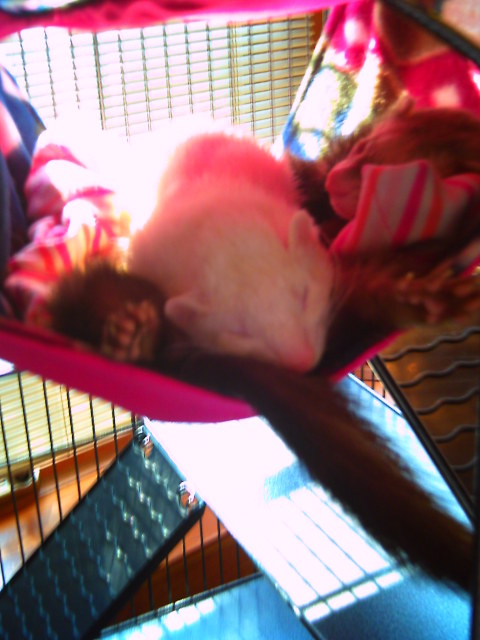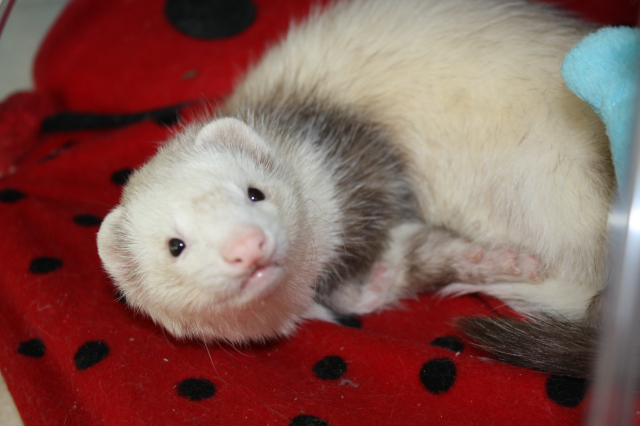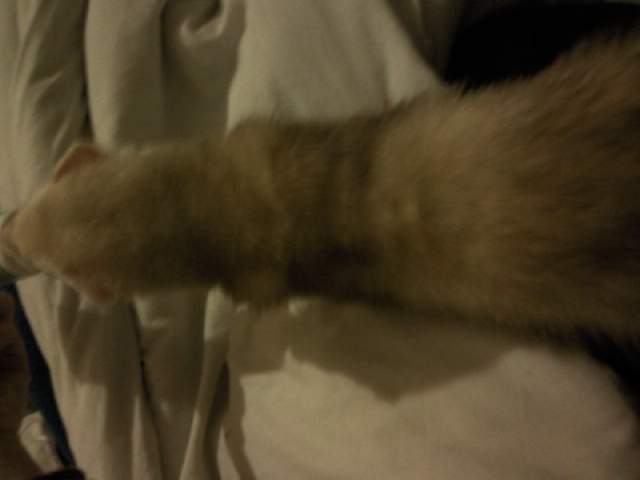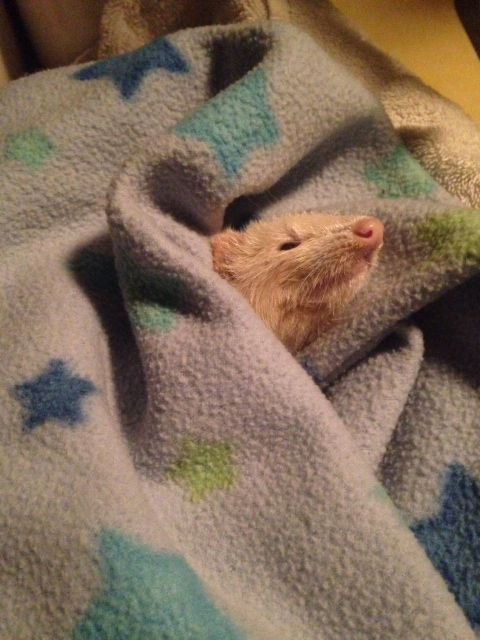QuestionI have a couple questions actually. My boyfriend and I just bought four ferrets from a lady who needed to get rid of them. One of them is 2, two of them are 3, and one is four years old and they are all up to date on shots. The previous owner told us that they've never had any health issues at all. They seem pretty healthy, but Bear (1 out of the 2 boys) is really overweight. They all eat Ultra-Blend Select and have been since they were born. Nothing else, so I don't understand why he's so big. He does eat a lot, but the smallest one (Flower/Female) eat probably the same amount and she looks under weight. Is this normal or what is a good diet to get them to healthy weights? Also, Bear seems to choke alot when he eats. But, its not choking like dying choking. He'll cough and wheeze for about an hour or so and it worries me. Is their a safe way for me to assist him when this happens?
AnswerHello Amanda,
You are wonderful people in my book! It is such a great thing that you and your boyfriend took those ferrets in. The three and four year olds are approaching "geriatric ferret" age, so they wouldn't do as well in a shelter environment. All ferrets have problems switching to shelter life, but ferrets that are on the older side have more of a problem with it, in my experience. It sounds like you are being great ferret parents, especially if you are first time ferret owners that took four ferrets in right off the bat! If you ever need anything else, I hope you will think of me to answer your ferret questions!
As for your current question, the way to tell if your ferret is overweight is pretty simple. Take him by the scruff of the neck (gently) and hold him up. If he looks like a bowling ball, or has a pear shape, then he is overweight. Here is some information on dealing with the overweight ferret:
http://www.faqs.org/faqs/pets/ferret-faq/part4/section-8.html
Basically, you might consider changing his food to a "leaner" food, such as Totally Ferret for the Older ferret. That doesn't have as many calories. Also, I'm not sure what your cage situation is, but if they aren't free roaming (if they don't have a room to themselves all the time), which isn't required, then maybe you might consider upping the out of cage time. Ferrets need at least three to four hours of out of cage play time a day so if your "kids" aren't getting that out time, I would suggest you up their out time. If they get that time, or if they are free roaming, then you should try playing with him more. Get him riled and get him running around and out of breath! Its a good workout for ferret parents, too! Ha ha. Our oldest male has a little extra weight on the hips so we've been making sure he gets his aerobic workouts! As the article says, though, make sure it isn't a problem that just makes him seem like he is overweight. Palpate his abdomen to feel for any lumps or bumps that shouldn't be there and make sure he doesn't have a cardiac condition. I might even get in touch with the vet that the previous owner took the kids to and see if he has any record of medical problems. If he doesn't have any problem, then just get his heart rate going and try to get him on that lower calorie food.
Another word about the food, I would like to add is: you should feed your ferrets a food that has about 36% protein, 20-22% fat and no more than 3% fiber. Also, taurine should be in there somewhere. Here is a chart listing some of the foods that people feed their ferrets:
http://www.mdferretpaws.org/care/food_treats.html
I would stay above a nine in the ranking if I were you. Another thing you want to look for in the food is that at least 3 of the first 5 ingredients are from meat products (and not fish). Also, stay away from foods with corn or corn products listed in the first three to five ingredients. If you are going to feed the Totally Ferret for Older Ferrets, then you might think about switching the other kids to Totally Ferret (normal formula) as well.
If you are feeding a food that doesn't quite go up to par as far as quality, you should switch their food . You need to make the change gradually because ferrets imprint on their food at a young age and they don't recognize anything else as food. Also, you're going to want to do it gradually to be easier on their tummies. You will probably see looser stool than normal for a few days. Just keep an eye on that and make sure they are staying hydrated. If it lasts for more than a week or if any of them get dehydrated or stop eating, you should have that ferret checked out by a qualified ferret vet. You should start out with about 85% old food and 15% new food. Keep that ratio for a few days and then put 75% old food and 25% new food and continue that for a few days and so on. You could even mix a couple high quality foods if you wanted to, just in case your normal food changes formula and your kids won't eat it!
To your next question, ferrets often "choke" on their food when they are eating because they tend to literally inhale it! If Bear seems to be having a real problem with it, then you can give him a "pat on the back". Ferrets can handle a pretty good "pat" as long as it is between their shoulders! If one of my kids are having trouble, I put them on my lap and sort of elevate their front end and give them a good pat between their shoulders with my first two fingers. That should help! Just to put you at ease, though, that is a general problem that ferret parents run into. If your kids are constantly hacking or coughing like they are trying to cough something up, that could mean a *partial* intestinal blockage, either a hairball or something they ate that they weren't supposed to. To help that situation, you can and should give them a hairball remedy around once a week in the "off" shedding season, and daily during the shedding season. The feline hairball remedy is okay, but it is a little sugary. Most ferrets aren't too resistant to Vaseline, especially with a little Ferretone drizzled on it.
I have found the best remedy for hairball prevention is a once monthly treatment of something called Vetasyl. It is the pet equivalent to Metamucil and it is a psyllium powder. It will bulk up their poop and hopefully that will catch whatever could be blocking the tract. With the Vetasyl treatment, though, you need to remember that it could actually cause a blockage so if you are feeling hesitant about it, then don't do it and stick to the Vaseline if that is what makes you more comfortable!
With the Vetasyl treatment, you should give it at least three days in a row (just once a day). You should take 8 ounces of water and mix in about a teaspoon of Uncle Jim's Duck Soup (http://www.petco.com/Shop/Product.aspx?familyid=10504&Ntt=Duck%20SOup&OneResultR...). You should mix enough water in to make it the consistency of a pretty thin gravy. After you mix that in, you should heat the mixture up just until it is a little warm (not too hot) and then you should mix in the Vetasyl (*****just ONE capsule and don't put the actual capsule in: break the capsule open and pour the powder in and then discard the capsule*****!). There are two important things to remember with this treatment : one is that you need to make sure they drink as much as they can and two : (and this is the most important!!!) they need to have A LOT of water (which is why the "mixture" should be a thin gravy sort of consistency). They need to be drinking a lot of water during this treatment because if they don't, that bulk forming laxative will cause a blockage in their system. You want to give the treatment every day for at least three days and if their poops aren't bigger or at least back to the size they normally are, you should either continue with the treatment or you should see a vet. With this, you should be watching their poops because you may see some pretty amazing things come out. When they use the bathroom, you should pick it up and put it in a plastic bag with water in it and squish away. I know, that sounds utterly disgusting, but you want to make sure that the treatment is doing its job if there is a blockage there. Also, when you are giving the mixture, make sure that you keep stirring it because if you don't, the bulk of the Vetasyl could sink to the bottom and it would be useless. Also, something else to remember with this treatment: only give it if you are going to be around your ferret(s) for the next few days that you give the treatment just in case it does cause a blockage and one of them needs to be taken to the vet. Otherwise, I wouldn't suggest this treatment for you.
Well, I think that covers all of it! I know that I gave you WAY more information than you asked for, so if you need anything clarified and anything more, then please don't hesitate to ask me! I'm here for you! Again, congratulations on your new little ones!
Sincerely,
Emilee Andrews

 How do you think Isis is?
QuestionCookie and Isis :)
QUESTION: Hello. :)
How do you think Isis is?
QuestionCookie and Isis :)
QUESTION: Hello. :)
 Shes so nippy
Question
Delilah
My boyfriend got me the cutest
Shes so nippy
Question
Delilah
My boyfriend got me the cutest
 Elderly ferret
Question
Booger
Hi,
I rescued an older ferret named Bo
Elderly ferret
Question
Booger
Hi,
I rescued an older ferret named Bo
 Fat boy with lumpy neck
QuestionOdins neck
QUESTION: Hi,
My 9 month old
Fat boy with lumpy neck
QuestionOdins neck
QUESTION: Hi,
My 9 month old
 My ferrets die
Question
Mia
My ferret die lest nite she was ten
My ferrets die
Question
Mia
My ferret die lest nite she was ten